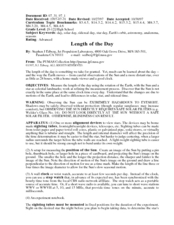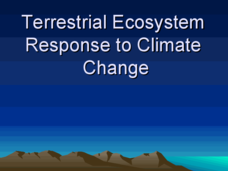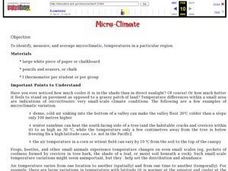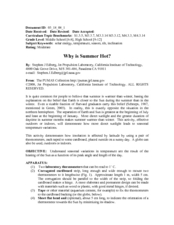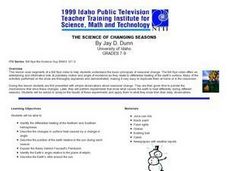Curated OER
How Does the Earth's Energy Budget Relate to Polar Ice?
Students use satellite data to see how radiation budget relates to the ice that is present in the North. In this energy lesson students correlate data to see a relationship.
Curated OER
Seasoning the School Year
Learners observe the changes a class tree goes through as the seasons change and record observations in journals. They investigate changes in the weather, changes in the length of the day, and how that affects people. They create...
Curated OER
Science Videos
Students plan, practice, and act in a 2-3 minute videotaped production about a specific topic. Students from a local high school give presentations pertaining to seasons, earth rotation, and moon phases. Students analyze the...
Curated OER
Seasons on Earth
Students engage in a multimedia study of the seasons in relation to the sun's angle of incidence on the Earth as it is tilted on its axis. They interpret satellite maps of the world as they show seasonal changes in plant life.
Curated OER
Length of the Day
Students investigate how the Earth's rotation affect the length of day. In this earth science lesson plan, students construct a sighting apparatus and record their observations over a few days. They analyze data collected and formulate a...
Curated OER
Terrestrial Ecosystem Response to Climate Change
An extensive investigation of the Earth's climate changes awaits your environmental science classes. This top-notch presentation begins by looking at the history of Earth's climate and then predicts the impact on each major terrestrial...
Curated OER
Outdoor Observation
Second graders explore Earth science by participating in a nature observation activity. In this four seasons lesson, 2nd graders identify the four seasons on Earth and the weather patterns they are known for. Students read several books...
Curated OER
Using Newsprint as a UV Detector
Middle schoolers investigate the effects of UV radiation. In this earth science lesson, students explain how the time of day relate to UV abundance on Earth. They determine if weather affects the amount of UV that Earth receives.
Curated OER
Apparent Motion of the Sun
Demonstrate the path of the sun across the sky at different times of the year with an engaging science lesson. Learners use a series of questions and diagrams to examine the movement of the sun and appearance of the sky around their...
Curated OER
Orbits Worksheet #1
A diagram of Earth's path around the sun, including the position of the moon, is displayed at the top of the worksheet. Five multiple questions get astronomers to analyze the diagram considering what is going on in the solar system. Use...
Curated OER
Motions and Their Effects
With a simple blackboard-style appearance, these slides list facts about the reason for the seasons, solstices, and equinoxes. It also touches on Kepler's first law of planetary motion. There are no pictures or graphics to help explain...
Curated OER
Great Rivers 2: The Ups and Downs of River Flooding
Second in a three-part lesson on rivers, this lesson focuses on the flooding that occurs in riparian locations. First, learners take a look at facts about the Amazon River. They read online materials and fill in a worksheet as they...
Curated OER
Micro-Climate
Atmosphere aces investigate the microclimates that exist within a larger area. They use a thermometer to record the varying temperatures and identify the microclimates on a map that they have drawn. This exercise helps them to understand...
Curated OER
A New Slant On The Seasons
Students identify how the tilt and position of the Earth causes the seasons. After a discussion of the seasons and when they begin. Using themselves as the objects in the universe, they role play how the rotational movement of the...
Curated OER
Student Exploration: Summer and Winter
In this recognizing the seasons online/interactive worksheet, students explore the Earth's positions and determine the summer and winter season. Students answer 21 short answer questions
Curated OER
Why is Summer Hot?
Students examine how variations in temperature are due to the Sun and length of day. In this solar lesson students complete a lab activity using thermometers and artificial sunlight to see how the earth is heated.
Curated OER
The Sun: Earth's External Heat Engine Part 1 of the Astronomy Model
Students become familiar with the variables that control Earth's solar energy supply. They explore the source and nature of solar energy, the genesis of radiation, and the structrue of the Sun, gas spectra are observed and sample...
Curated OER
The Four Seasons - Earth's Axis
Pupils discover that it is the tilt of the earth's axis that results in the seasons. They clarify common misconceptions about the earth's orbit around the sun.
Curated OER
Reasons for Seasons
Students investigate a model of the tilt of the Earth in its relationship to the Sun during the different seasons of the year. They study the solstices and equinoxes, while determining how sunlight hits the Earth with different angles in...
Curated OER
Earth Day - Grow A Seed Garden
Students discover how things grow and how they can take better care of the environment in this Earth Day instructional activity for the elementary classroom. The activity can be accomplished in one day and left in the sun until the...
Curated OER
Earth Day - Bursting Beans
Students fill jars with dried beans and water, cover the jars, and wait to see what happens in this excellent Science experiment ideal for Earth Day (April 22nd). Emphasis is placed on discovering the reactions of seeds to water.
National Geographic
The Monsoon
Few things are as fascinating as the challenge of climbing Mount Everest. This lesson investigates how monsoon weather impacts climbers. To begin, you are instructed to show various video clips. The only one directly provided, however,...
Curated OER
The Science of Changing Seasons
Students explore basic principles of seasonal change, ponder the mechanisms that drive these changes, and perform experiments that show what causes the earth to heat differently during different seasons.
Curated OER
Seasonal Cloud Cover Variations
Students, in groups, access data from the NASA website Live Access Server regarding seasonal cloud coverage and the type of clouds that make up the coverage. They graph the data and make correlations between types, seasons and percentages.






